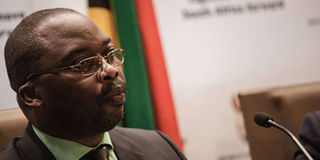Africa-ICC relationship seems to have come full circle

South Africa's Justice Minister Michael Masutha gives a press briefing in Pretoria on October 21, 2016 on the country's decision to withdraw from the International Criminal Court. PHOTO | GIANLUIGI GUERCIA | AFP
What you need to know:
- Many were stunned when Burundi announced it intended to withdraw from the International Criminal Court.
- President Pierre Nkurunziza signed decree for the country to break ranks with it.
The move came after Parliament voted overwhelmingly to remove the country from the court’s jurisdiction.
The court described the decision as setback in fight against impunity.
Amid alarming developments like a reported coup attempt in Burkina Faso, the uneasy relationship between Africa and the International Criminal Court seems to have come full circle.
The coup bid aside, crises in Ethiopia, the Democratic Republic of Congo, Burundi, the Central African Republic and others have become the bane of the continent.
Given this political climate, many were stunned when Burundi last Tuesday announced that it intended to withdraw from the court. President Pierre Nkurunziza then signed a decree for the country to break ranks with the global institution.
The move came after parliament voted overwhelmingly, in the preceding week, to remove the country from the court’s jurisdiction.
The decision was described by the court as a setback in the fight against impunity.
Despite its good intentions, the ICC has run afoul of many an African leader, who have persistently questioned the institution’s objectivity. The situation has not been improved by the fact that nine out of 10 matters under investigation by ICC relate to Africa.
But whereas in the past, the African Union has urged member states not to co-operate with ICC, it is not clear how many countries are prepared to quit the court.
BEGAN PROCESS
As if on cue, South Africa on Friday formally began the process of withdrawing from the ICC.
South Africa was apparently making good a warning issued last year. When the moment of reckoning finally came, the “instrument of withdrawal” was signed by the foreign minister.
Unlike the case of Burundi, the South African parliament is yet to be involved in the process.
South Africa said whereas it recognised its “obligations with respect to the peaceful resolution of conflicts”, its outlook was deemed to be incompatible with the interpretations of the ICC regarding such matters.
Burundi was infuriated when ICC launched investigation into killings, imprisonment, torture, sexual violence and disappearances reportedly committed by state organs.
The court’s conclusion was that politically inspired violence had resulted in the killing of about 450 people and forced hundreds of thousands to flee. The findings were buttressed last month by a damning UN report.
Prepared by special investigators, the report named officials accused of orchestrating torture and killings. In response, Bujumbura declared three UN investigators persona non grata.
The move by Burundi and South Africa has attracted criticism. Human Rights Watch called for a slowing down of withdrawals from the ICC. An Africa division researcher with HRW called for greater support for the policy of “accountability for victims of the gravest crimes.”





